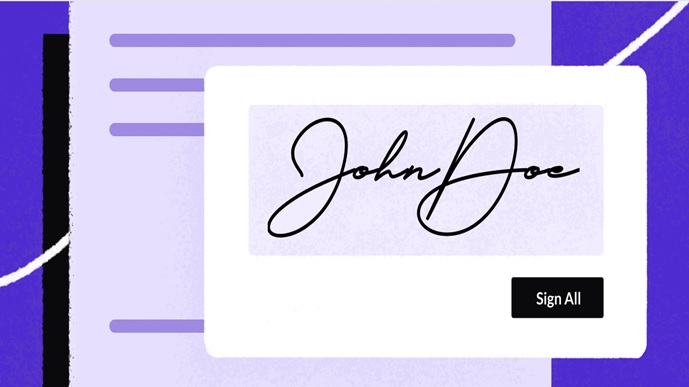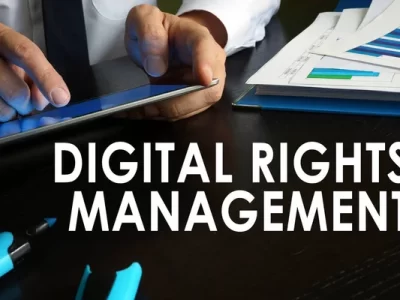
Where businesses operate at lightning speed, the traditional methods of signing documents can be a significant bottleneck in the workflow. This is where online signing and electronic signatures come into play.
Online signing lets businesses streamline operations, save time, and improve efficiency. With eSignatures, the cumbersome task of printing, signing, and scanning physical documents becomes a thing of the past. Instead, businesses can sign documents electronically, eliminating the need for physical paperwork and manual signatures.
The concept of eSignatures refers to the digital equivalents of handwritten signatures. They are created and applied using secure electronic methods, ensuring the authenticity and integrity of the signed documents. eSignatures hold the same legal validity as traditional signatures, making them a reliable and widely accepted solution for businesses.
The significance of eSignatures for businesses cannot be overstated. They offer many benefits, including increased productivity, cost savings, enhanced security, and improved customer experiences. By adopting online signing and eSignatures, businesses can streamline their document workflows, reduce administrative burdens, and accelerate decision-making processes. Furthermore, eSignatures provide a higher level of security and compliance, ensuring that documents remain tamper-proof and legally binding.
In the following sections, we will explore the various aspects of online signing for businesses and delve into the practical applications of using eSignatures to optimize operations and achieve success.
Benefits of eSignatures for businesses
Time and cost are valuable resources that every organization strives to optimize. One of the most significant advantages of eSignatures is the substantial time and cost savings they bring. Businesses face delays in printing, mailing, and manually processing documents. In contrast, eSignatures enable instant signing, eliminating the need for physical paperwork and reducing the time spent on manual tasks. This efficiency translates into faster deal closures, shorter project timelines, and increased productivity.
With the ability to sign documents online, businesses can streamline their workflows and eliminate the inefficiencies associated with paper-based processes. By removing manual steps and automating the signing process, businesses can reduce delays and bottlenecks. Documents can be signed and processed in real-time, accelerating contract approvals, vendor agreements, and other critical business transactions. Teams can collaborate seamlessly, regardless of physical location, by signing and sharing documents electronically.
Furthermore, eSignatures provide improved security and compliance compared to traditional signatures. Electronic signature solutions offer robust authentication mechanisms, encryption, and audit trails, ensuring the integrity and authenticity of signed documents. This helps businesses meet regulatory requirements and industry standards, reducing the risk of fraud and unauthorized access to sensitive information.
How online signing works
Online signing offers businesses a convenient and secure way to handle document signing processes. Understanding how it works can help organizations leverage this powerful tool more effectively.
To sign online, businesses need to follow a few simple steps.
- First, the document is uploaded to an electronic signature platform or software.
- Then, the sender specifies the recipients and their roles in the signing process.
- The recipients receive an email notification or a link to access the document.
- They can review the document, electronically sign it using various methods such as drawing, typing, or uploading a pre-made signature, and add any necessary annotations or comments.
- Once all parties have signed, the completed document is securely stored and can be downloaded or shared as needed.
Various methods and technologies are used for online signing, including digital signatures, cryptographic methods, and secure authentication protocols. These technologies ensure the integrity and authenticity of the signed documents. Authentication mechanisms, such as unique login credentials or verification codes, verify the identities of the signing parties. Encryption is applied to the document and the signature data to protect them from unauthorized access or tampering.
By implementing strong authentication methods and encryption protocols, businesses can ensure the confidentiality, integrity, and non-repudiation of their signed documents, bolstering trust and compliance.
Legal validity of eSignatures
eSignatures have gained widespread acceptance and legal validity in many jurisdictions, allowing businesses to rely on them for document signing. The legal landscape surrounding eSignatures varies from country to country, but in general, there are laws and regulations in place to recognize their enforceability.
Relevant laws, such as the Electronic Signatures in Global and National Commerce Act (ESIGN) in the United States and the eIDAS Regulation in the European Union, establish the legal framework for eSignatures. These laws outline the requirements for electronic signatures to be considered valid, including factors such as intent to sign, consent, and the ability to accurately associate the signature with the signer.
To ensure compliance with legal requirements, businesses should familiarize themselves with the laws and regulations governing eSignatures in their jurisdiction. It is important to choose an eSignature solution that meets the legal standards, provides appropriate audit trails, and offers tamper-evident technology for added security. Additionally, maintaining proper record-keeping practices and retaining signed documents in a secure and accessible manner is crucial for legal compliance.
Use cases for online signing in business
By leveraging online signing, businesses can enhance operational efficiency, reduce manual errors, improve compliance, and provide a seamless and convenient signing experience for all parties involved. Let’s explore some common use cases where online signing can be particularly valuable.
- Contracts and agreements: Online signing simplifies contract management, allowing businesses to securely and conveniently execute agreements with clients, vendors, and partners. Whether it’s a sales contract, a service agreement, or a licensing agreement, online signing eliminates the need for manual paperwork, reduces turnaround time, and enhances the overall efficiency of contract execution.
- Sales and purchase orders: With online signing, businesses can streamline their sales and procurement processes by digitally signing sales orders, purchase orders, and other related documents. This enables swift and secure transactions, reducing the time and effort spent on manual paperwork and expediting order fulfillment.
- HR and employee documents: Online signing facilitates the completion and processing of various HR documents, including employment contracts, offer letters, confidentiality agreements, and performance reviews. By eliminating the need for physical signatures and paper-based documentation, businesses can accelerate the onboarding process, improve record-keeping, and enhance overall HR efficiency.
- Compliance and consent forms: Businesses often need to collect consent and compliance forms from clients, customers, and employees. Online signing provides a convenient and secure method to obtain legally binding signatures on these documents, ensuring compliance with regulations and simplifying the consent management process.
- Financial transactions and invoices: Online signing enables businesses to streamline financial processes by digitally signing invoices, payment authorizations, and financial agreements. This expedites payment cycles, reduces administrative overhead, and enhances the overall financial efficiency of the organization.
Choosing the right eSignature solution
When evaluating eSignature software or services, several factors should be considered. These include ease of use, security features, pricing plans, customer support, and scalability. It is also essential to assess the compatibility and integration capabilities of the eSignature solution with existing business systems and workflows.
Comparing popular eSignature solutions in the market can help businesses make informed decisions. Each solution may offer unique features and functionalities, such as mobile compatibility, document management capabilities, and advanced authentication options. By assessing the strengths and limitations of different eSignature solutions, businesses can determine which aligns best with their specific requirements.
Integration with existing business systems is another critical aspect to consider. The chosen eSignature solution should seamlessly integrate with the organization’s document management systems, customer relationship management (CRM) software, and other relevant platforms. This integration ensures a smooth data flow, eliminates duplicate entries, and enhances overall workflow efficiency.
Conclusion
eSignatures have revolutionized the way businesses handle document signing processes. The benefits of eSignatures, including time and cost savings, enhanced efficiency, improved security, and streamlined workflows, cannot be overstated. By adopting online signing solutions, businesses can transform their document management practices and experience the convenience and advantages of digital transactions.
The convenience, speed, and accuracy offered by eSignatures not only improve operational efficiency but also enhance customer experiences and strengthen business relationships.
Looking ahead, the future of eSignatures in the business landscape is promising. As technology continues to advance and more organizations recognize the advantages of digital processes, the adoption of eSignatures is expected to increase. Additionally, with the growing emphasis on remote work and virtual collaboration, the demand for secure and efficient online signing solutions will continue to rise.
It’s time for businesses to embrace the digital revolution and unlock the full potential of eSignatures.














